Civil Rights Activists in History

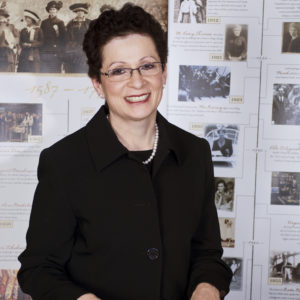
Jill S. Tietjen, PE, is an author, national speaker, and…

Charlotte S. Waisman, Ph.D. is a national champion and advocate…
We learned recently about the woman whose heroic action laid the groundwork for Rosa Parks more well-known experiences. Her name is Irene Morgan and in 1944, she boarded a Greyhound bus in Gloucester County, Virginia. Although the bus had few passengers when she got on, at Saluda, Virginia, many people boarded and she was asked to relinquish her seat to a white passenger. She refused. The sheriff arrested her and she resisted. She was jailed and later fined for resisting arrest. The NAACP took her case: Morgan v. Virginia. She was represented by Thurgood Marshall and her case went to the U.S. Supreme Court – where on June 3, 1946, the justices ruled 7-1 in her favor. In her honor, an historic marker was recently unveiled. It was placed at the point where she got on the bus. In this month’s column we feature women whose groundbreaking efforts helped gain civil rights for all in our country. All of the women profiled in the paragraphs that follow have been inducted into the National Women’s Hall of Fame.
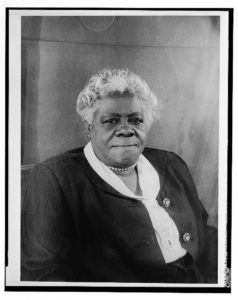
The founder of what is today Bethune-Cookman University, Mary McLeod Bethune started her school for African American girls in 1904 in Daytona Beach, Florida. She had $1.50, five female students and her son. Starting from what we clearly would call a shoestring operation, within one year the school had 30 students. In 1923, her school merged with Cookman Institute of Jacksonville, Florida and became accredited as Bethune-Cookman College in 1931. Bethune-Cookman achieved University status in 2007. Bethune’s legacy extends much further than her namesake University. A noted civil rights advocate as well as an educator, she founded the National Council of Negro Women (NCNW) and also served as an advisor to several presidents. An early member of the NAACP, Bethune has been featured on a U.S. postage stamp. The former headquarters of the NCNW is now under the auspices of the National Park Service and is known as the Mary McLeod Bethune Council House National Historic Site. In her will she said “I leave you a thirst for education. Knowledge is the prime need of the hour.” She also said “If I have a legacy to leave my people, it is my philosophy of living and serving.”
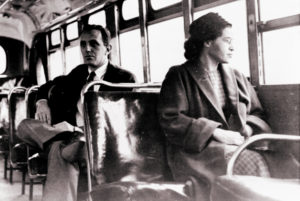
When Rosa Parks refused to give up her seat to a white man on the city bus in Montgomery, Alabama on December 1, 1955 and was arrested, she took the first step to become known as “the mother of the civil rights movement.” She was convinced to become the plaintiff in a lawsuit against the segregation laws in the city, which were eventually overturned by the U.S. Supreme Court. Parks said in her memoirs, “People always say that I didn’t give up my seat because I was tired but that isn’t true. I was not tired physically. . . No, the only tired I was, was tired of giving in.” Parks received the NAACP’s Spingarn Medal, the Congressional Gold Medal, the Presidential Medal of Freedom, and a statue in the Capitol’s National Statuary Hall. When she died, she became the first woman and the second African American to lie in honor in the Capital Rotunda.
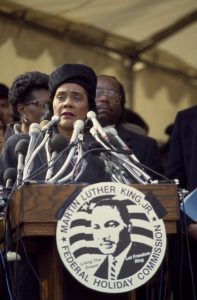
Originally a trained singer, Coretta Scott King is well known as a civil rights activist. As she participated in the Montgomery, Alabama bus boycott sparked by Rosa Parks, she related “I had a growing sense that I was involved in something so much greater than myself, something of profound historic importance. I came to the realization that we had been thrust into the forefront of a movement to liberate oppressed people, not only in Montgomery but also throughout our country, and this movement had worldwide implications. I felt blessed to have been called to be a part of such a noble and historic cause.” Later, she was a key figure in getting the 1964 Civil Rights Act passed. While she often worked beside her husband Martin Luther King, Jr., she also had a separate career as a public mediator and liaison to peace and justice organizations. After her husband’s death, she established the Martin Luther King, Jr. Center for Social Change and succeeded in getting her husband’s significant life and work memorialized through a national holiday. King said “Women, if the soul of the nation is to be saved, I believe that you must become its soul.”

Ella Baker’s commitment to social justice was sparked by her grandmother’s stories about life under slavery. As an undergraduate student, she challenged policies that she thought were not fair. Her social activism career began when she moved to New York City after college graduation. Her work with the NAACP began in 1940 when she worked as a field secretary and then director of branches. In 1957, she moved to Atlanta to organize Martin Luther King Jr.’s Southern Christian Leadership Conference. After the Greensboro, North Carolina sit-ins, Baker organized the Student Nonviolent Coordinating Committee. Throughout her life, Baker believed that the right to vote was an important key to freedom.
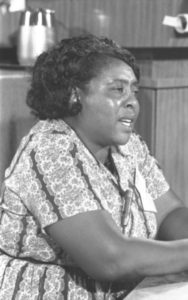
Fannie Lou Hamer began her civil rights advocacy after endeavoring to register to vote when she was 45 years old. In Mississippi, in 1962, this was not behavior that was encouraged and she lost her job and home as a result. These actions only fortified her now significant resolve to help African Americans get the right to vote. She worked for the Student Nonviolent Coordinating Committee that had been established by Ella Baker; the members consisted primarily of students who organized protests and worked for justice for blacks in the South. In the process, she was beaten, arrested and shot at. Hamer helped found the Mississippi Freedom Democratic Party and brought the cause of civil rights to the 1964 Democratic National Convention. Hamer’s tombstone contains her famous phrase “I am sick and tired of being sick and tired.”
Women participate and contribute to every area of our lives. These civil rights activists, as well as many others, almost all of whom we have not heard about nor learned about in school, are profiled in our book, Her Story: A Timeline of the Women Who Changed America. Help us by continuing to tell women’s stories. Write women back into history!
Author: Jill Tietjen
Jill S. Tietjen, PE, is an author, national speaker, and an electrical engineer. After 40 years in the electric utility industry, her professional focus is now on women’s advocacy, worldwide. She blogs for The Huffington Post, speaks nationally on the accomplishments of women, nominates women for awards, and continues to write books (8 published to date), following in the footsteps of her bestselling and award-winning book, Her Story: A Timeline of the Women Who Changed America (written with Charlotte Waisman). She is a frequent keynote speaker as her positive energy and her ability to relate to the audience result in inspired and energized listeners. The recipient of many awards, her induction into the Colorado Women’s Hall of Fame in 2010 remains one of her most treasured.

Jill S. Tietjen, PE, is an author, national speaker, and an electrical engineer. After 40 years in the electric utility industry, her professional focus is now on women’s advocacy, worldwide. She blogs for The Huffington Post, speaks nationally on the accomplishments of women, nominates women for awards, and continues to write books (8 published to date), following in the footsteps of her bestselling and award-winning book, Her Story: A Timeline of the Women Who Changed America (written with Charlotte Waisman). She is a frequent keynote speaker as her positive energy and her ability to relate to the audience result in inspired and energized listeners. The recipient of many awards, her induction into the Colorado Women’s Hall of Fame in 2010 remains one of her most treasured.

Charlotte S. Waisman, Ph.D. is a national champion and advocate for women as a professor and keynote speaker. A corporate leader, executive coach, and facilitator, she conducts leadership workshops nationally.



